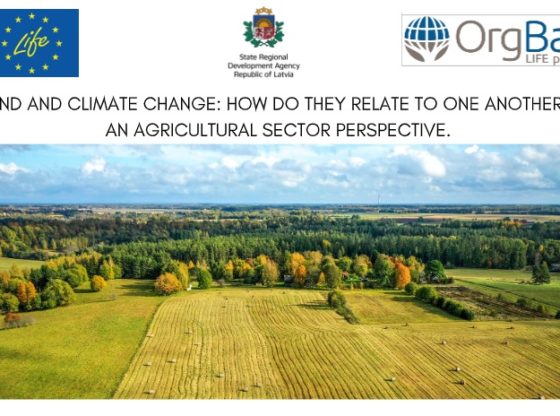Agriculture is highly exposed to climate change, as farming activities directly depend on climatic conditions. However, it represents also a unique sector since not only contributes to climate change through the release of greenhouse gases into the atmosphere, but acts also as sink by removing carbon from the atmosphere and storing it in the soil[1].
We explored the opportunities and challenges related to these aspects with the help of experts from all partner countries of the LIFE OrgBalt project.
Undrained organic soils remove carbon dioxide from the atmosphere and store it as soil carbon matter. At the same time, “according to internationally recognized greenhouse gas calculation methodology (from the Intergovernmental Panel on Climate Change IPCC guidelines)”, states the research team of the Latvian State Forest Research Institute “Silava”, leading partner in the LIFE OrgBalt project, “drained nutrient-rich organic soils can be a significant source of greenhouse gas emissions especially if managed for agriculture purposes (croplands and grasslands) because the decomposition of soil organic material leads to an increase in carbon dioxide and nitrous oxide emissions. Scientific hypothesis suggests that the amount of greenhouse gas emissions can be decreased by introducing management changes that shift organic soils more towards a sink state. The LIFE OrgBalt project researchers and experts are working to find the most effective “sink” measures to be suggested to policy makers as effective climate change mitigation measures.”
If sustainably managed, in fact agricultural soils can contribute to the reduction of greenhouse gas emissions. On the other hand, mismanagement of these soils can decrease their greenhouse gas reduction and removal potential.
The LIFE OrgBalt project aims to identify and to demonstrate sustainable, resilient, and cost-effective climate change mitigation measures applicable in drained nutrient-rich organic soils and to provide tools and guidance for the elaboration, implementation, and verification of the results of climate change mitigation policies.
Climate change in fact is not just a theoretical debate, but a concrete challenge that has a deep impact on farmers’ activity.
We tried to investigate the difficulties faced by the agricultural sector, such as the impact of climate changes, the role played by sustainable management from a farmers’ perspective and mitigation potential to reduce greenhouse gas emissions and increase soils productivity, by collecting some voices from the field thanks to representatives of the agricultural sector from all partner countries. Lack of information, need to conduct further research to provide concrete solutions at the service of the agricultural sector, and the urgency of informative and training sessions for farmers were highlighted by all interviewee, as a potential key to increase the knowledge on mitigation measures potential to reduce greenhouse gas emissions and increase soils productivity, within the agricultural sector. Along with training, the need of support mechanism, such as incentives, to support farmers and increase their willingness to pursue measures with long-term goals has been highlighted.
LIFE OrgBalt Team
READ THE FULL ARTICLE TO FIND OUT MORE!
The article has been produced with the financial support of the LIFE Programme of the European Union and the State Regional Development Agency of Latvia within the Project “Demonstration of climate change mitigation potential of nutrient rich organic soils in Baltic States and Finland” (LIFE OrgBalt, LIFE18 CCM/LV/001158)
The developed material reflect
only the LIFE OrgBalt project beneficiaries’ view and the European Commission’s
Executive Agency for Small and Medium-sized Enterprises is not responsible for
any use that may be made of the information they contain.
[1] https://ec.europa.eu/info/food-farming-fisheries/sustainability/environmental-sustainability/climate-change_en


